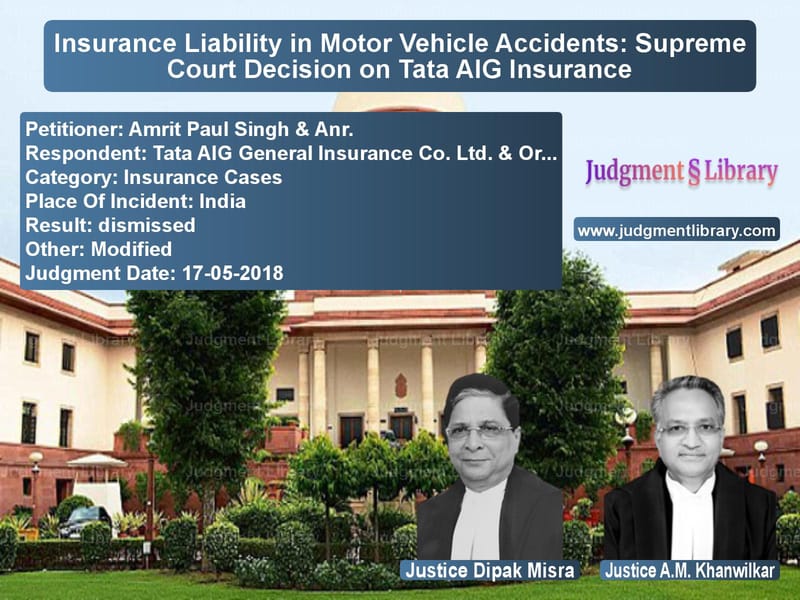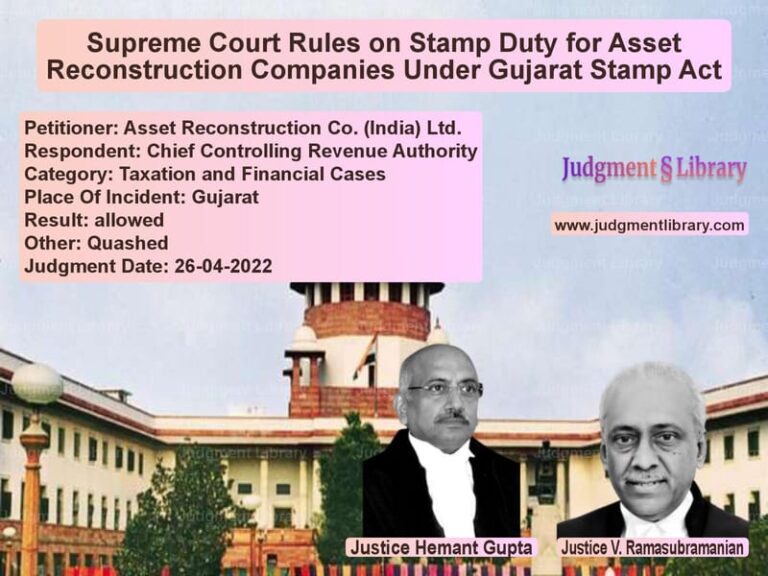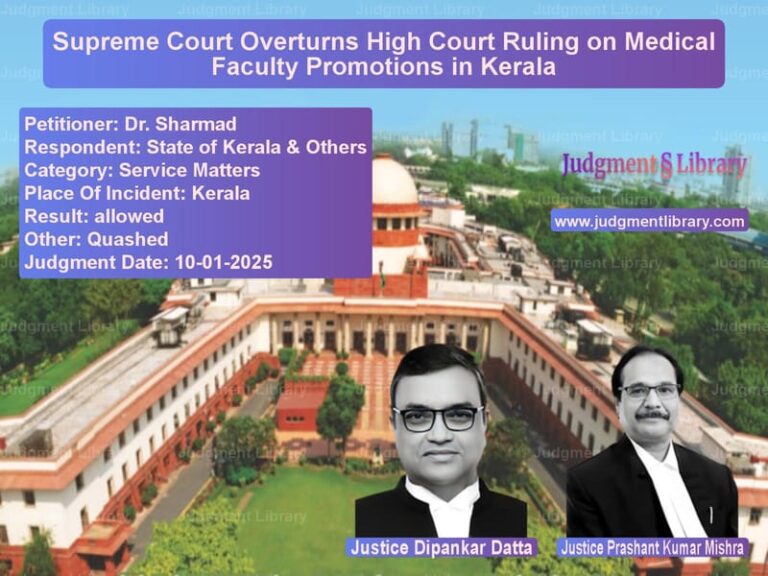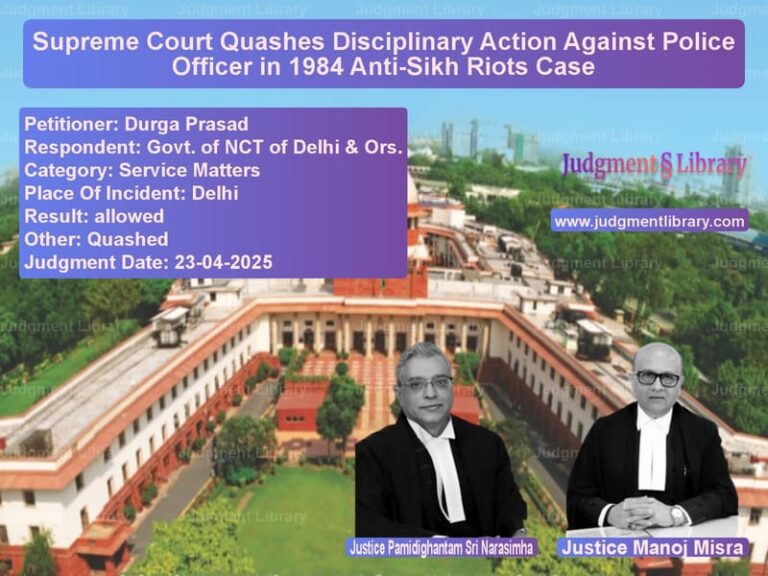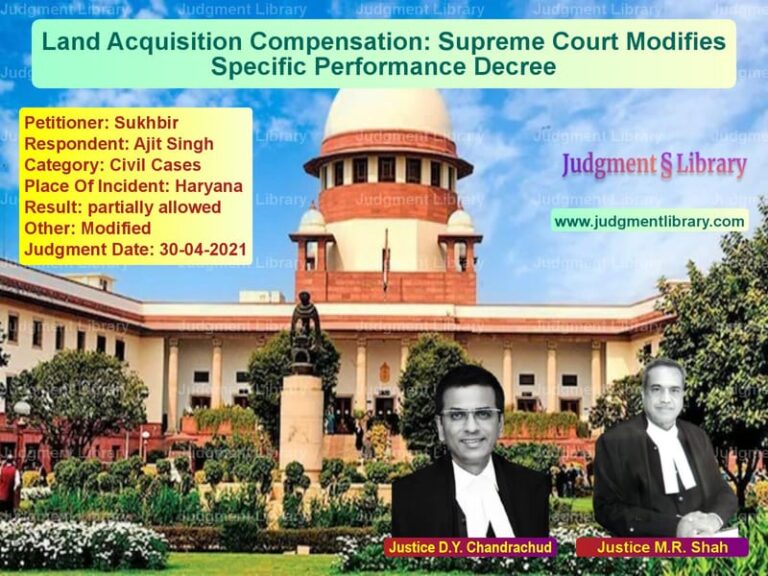Insurance Liability in Motor Vehicle Accidents: Supreme Court Decision on Tata AIG Insurance
The case of Amrit Paul Singh & Anr. v. Tata AIG General Insurance Co. Ltd. & Ors. revolves around the liability of an insurance company when a vehicle involved in a fatal accident was being operated without a valid permit. The Supreme Court examined whether the insurer could be held liable to pay compensation under such circumstances.
Background of the Case
The legal representatives of Jagir Singh, the deceased, filed a claim petition before the Motor Accident Claims Tribunal (MACT) under Section 166 of the Motor Vehicles Act, 1988, seeking compensation of Rs. 36,00,000. The accident occurred on February 19, 2013, when Jagir Singh was riding his motorcycle and was hit by a truck driven negligently, leading to his death.
The insurance company, Tata AIG, opposed the claim on the ground that the vehicle lacked a valid permit at the time of the accident. This raised the legal question of whether an insurer can avoid liability when the insured vehicle does not have the necessary permits.
Legal Issues
The Supreme Court had to determine:
- Whether an insurance company is obligated to compensate a third party when the insured vehicle lacked a valid permit.
- Whether the absence of a permit constitutes a fundamental breach of policy conditions.
- Whether the insurer can recover the compensation amount from the vehicle owner after paying third-party claims.
Arguments by the Petitioners
The petitioners contended:
- The truck was insured, and the insurer should be liable to pay compensation.
- The absence of a permit was a procedural lapse and not a fundamental breach.
- The insurance policy covered third-party claims irrespective of the permit status.
- The insurer’s refusal to honor the claim violated third-party protection under the Motor Vehicles Act.
- Insurance policies must be interpreted in favor of innocent third parties rather than penalizing them for policyholder lapses.
Arguments by the Respondents
The insurance company argued:
- The vehicle was operated in violation of the Motor Vehicles Act, 1988.
- The absence of a permit was a fundamental breach of the insurance contract absolving the insurer from liability.
- The insurer cannot be forced to pay for damages when the policyholder violated statutory obligations.
- Allowing compensation in such cases would encourage negligent policyholders to bypass regulatory requirements.
- Judicial precedents establish that fundamental breaches of policy conditions provide insurers a valid defense.
Supreme Court’s Observations
After analyzing both sides, the Supreme Court made the following observations:
- 1. Absence of a Permit: The Court noted that the vehicle did not have a valid permit at the time of the accident, violating Section 66 of the Motor Vehicles Act.
- 2. Third-Party Protection: The Motor Vehicles Act ensures that third-party claimants are protected, and insurers cannot deny liability based on minor procedural lapses.
- 3. Recovery Rights of Insurers: The Court ruled that while insurers must compensate victims, they retain the right to recover the amount from the insured party.
- 4. Causal Link Requirement: The absence of a permit did not contribute to the accident, so it cannot be a basis for rejecting a third-party claim.
- 5. Public Policy Considerations: The Court highlighted that denying claims due to technical lapses would contradict the objectives of mandatory insurance laws.
Final Judgment
The Supreme Court ruled:
- The insurer must pay compensation to the deceased’s legal representatives.
- The insurer has the right to recover the compensation from the vehicle owner.
- The tribunal’s order directing the insurer to pay the compensation amount with interest was upheld.
- Technical lapses by the policyholder cannot be used to deny third-party claims.
Impact of the Judgment
The ruling has broad implications for third-party insurance claims. It reinforces the legal principle that insurers cannot use minor breaches by policyholders as a shield against compensating innocent third parties.
- Insurance Sector: Insurers must carefully draft policy conditions to balance compliance with statutory obligations and the protection of third parties.
- Legal Precedents: The judgment aligns with prior rulings favoring third-party protection under motor vehicle laws.
- Policyholders: Vehicle owners must ensure compliance with permit requirements to avoid potential financial liabilities.
Conclusion
This ruling is a landmark judgment reinforcing third-party protection in motor vehicle accidents. The decision ensures that insurance companies cannot arbitrarily reject claims unless they can prove a direct causal link between the breach of policy conditions and the accident.
Petitioner Name: Amrit Paul Singh & Anr..Respondent Name: Tata AIG General Insurance Co. Ltd. & Ors..Judgment By: Justice Dipak Misra, Justice A.M. Khanwilkar.Place Of Incident: India.Judgment Date: 17-05-2018.
Don’t miss out on the full details! Download the complete judgment in PDF format below and gain valuable insights instantly!
Download Judgment: Amrit Paul Singh & A vs Tata AIG General Ins Supreme Court of India Judgment Dated 17-05-2018.pdf
Direct Downlaod Judgment: Direct downlaod this Judgment
See all petitions in Commercial Insurance Disputes
See all petitions in Insurance Settlements
See all petitions in Judgment by Dipak Misra
See all petitions in Judgment by A M Khanwilkar
See all petitions in dismissed
See all petitions in Modified
See all petitions in supreme court of India judgments May 2018
See all petitions in 2018 judgments
See all posts in Insurance Cases Category
See all allowed petitions in Insurance Cases Category
See all Dismissed petitions in Insurance Cases Category
See all partially allowed petitions in Insurance Cases Category

